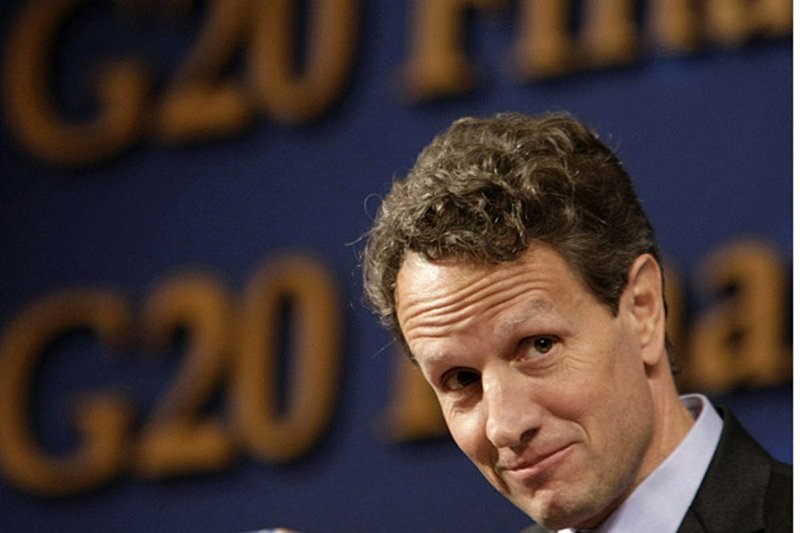GYEONGJU, South Korea — Global finance leaders promised Saturday to refrain from a currency war and reduce trade imbalances, amid growing recognition that restructuring the world economy is necessary to accommodate the greater role of fast-growing China and other developing economies.
The Group of 20 also agreed to overhaul the International Monetary Fund to increase its role in managing the world economy and give emerging nations more say in how the organization is run, which IMF Managing Director Dominique Strauss-Kahn called the “biggest reform” of IMF governance since the institution was created in 1945.
Finance ministers and central bank governors met for two days in the South Korean city of Gyeongju ahead of a summit of their leaders in Seoul next month.
The G-20 includes rich countries such as the U.S., Japan and Germany as well as emerging ones like China, India and Brazil. It operates through consensus and peer pressure but lacks binding authority.
The greatest surprise of the summit was the agreement on changes to the IMF.The G-20 agreed to transfer more than 6 percent of voting power within the IMF to “dynamic emerging-market and developing countries” like Brazil and India by the fall of 2012. “The legitimacy of the IMF is increasing,” Pranab Mukherjee, the Indian finance minister, said approvingly.
China will become the fund’s third-largest shareholder, behind the United States and Japan but ahead of Germany, France and Britain. Europe agreed to surrender two seats on the 24-member executive board.
As part of a package deal, the G-20 also agreed to double the IMF’s quotas, which determine how much each country contributes to - and may borrow from - the institution. The quotas presently total about $340 billion.
“It is a milestone in reforming global governance,” said Olli Rehn, economic and monetary affairs commissioner of the European Union, which also belongs to the G-20. “Today we have been rebalancing global growth and rebalancing political influence in global governance.”
Like the G-20, the IMF cannot compel members to act, but its findings carry great weight.
SURPLUS AND DEFICITS
The United States failed to secure support for a numerical limit on the surplus or deficit of the nations’ current account balances, the broadest measure of a country’s trade and investment. The Americans had proposed that surplus and deficits be reduced to less than 4 percent of gross domestic product by 2015.
Such an agreement would have obliged two export giants, China and Germany, to stimulate domestic consumption and rely less on foreign consumers. China, in particular, would have faced new pressure to let its currency, the yuan, rise in value againstthe dollar.
While the numerical limit was not adopted, officials did agree to “move toward more market-determined exchange rate systems that reflect underlying economic fundamentals” and to “refrain from competitive devaluation of currencies.”
That language was the strongest yet from the G-20 after warnings by the United States that rapidly developing countries were trying to keep their currencies from rising, setting off a “damaging cycle” of “competitivenonappreciation.”
Nations in Asia and other regions have been trying to stem strength in their currencies amid sustained weakness in the U.S. dollar out of fear that their exports will become less competitive. At the same time, China’s currency, the yuan, has been effectively pegged to the greenback, provoking criticism it is being kept artificially low and giving the country’s exporters an unfair advantage.
Asia relying less on exports for growth is seen asone of the adjustments that nations should make to ensure more stability in the global economy and markets. Stronger currencies, meanwhile, would make imported goods cheaper and boost local spending as a contributor to economic growth.
Even as it runs a trade surplus and builds currency reserves, China has curbed the yuan’s rise to about 2 percent since a June pledge to introduce more flexibility, arguing that anything other than a gradual appreciation would cause social andeconomic disruption. At the same time, the Fed has sent the dollar tumbling by leaning toward the purchase of more assets to tackle unemployment near a 26-year high and weak inflation.
“I think it’s fair to say for the first time we see the major economies come together and recognize that excess imbalances that persist over a period of time, that can threaten growth and financial stability, need to bring about adjustments in policies,” U.S. Treasury Secretary Timothy Geithner told reporters after the meeting.
EMPOWERING THE IMF
The G-20 also continued to increase the role of the IMF as a watchdog over its member economies in the hope that it might help arbitrate thorny trade and currency disputes. Officials agreed to empower the IMF to investigate the “persistently large imbalances” and determine “the root causes” of why adjustment has been so hard to achieve.
With cooperation dissipating as the financial crisis eased, the United States has called on the IMF to be more blunt and effective in monitoring its members’ policies.
“The agreement here will play a critical role in removing uncertainty in the global markets such as the foreign exchange rate issues,” said Yoon Jeung-hyun, the South Korean finance minister. “This will put an end to the controversy over foreign exchange rates.”
George Osborne, Britain’s chancellor of the Exchequer, was not quite so optimistic,though he praised the accord.
“What people have been nervous about is that the current imbalances get worse as countries other than China look potentially at the route of competitive devaluation, and this language calms everything down and gives us a route map for resolving these imbalances,” he said.
Information for this article was contributed by Kelly Olsen, Kwang-tae Kim and Tomoko A. Hosaka of The Associated Press; by Sewell Chan of The New York Times; and by Simon Kennedy, Eunkyung Seo, Rebecca Christie, Mark Deen, Rainer Buergin, Keiko Ujikane, Frances Yoon, Peter Cook, Paul Badertscher, Sunil Jagtiani, Shamin Adam and Liz Capo McCormick of Bloomberg News.
Front Section, Pages 1 on 10/24/2010

